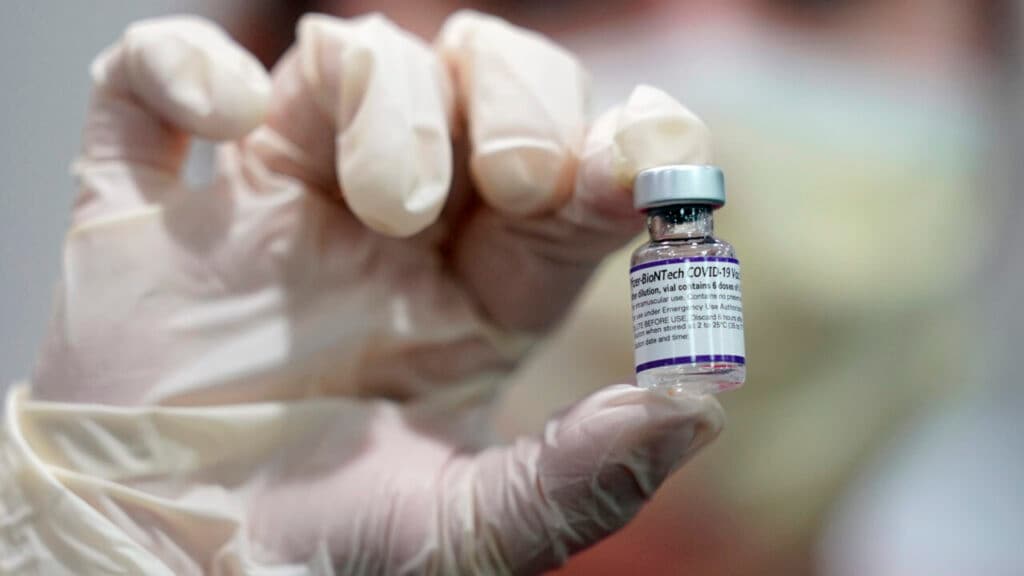Pfizer asks US to allow vaccine shots for children ages 5 to 11
If regulators give the go-ahead, reduced-dose kids’ shots could begin within a matter of weeks for the roughly 28 million U.S. children in that age group.
Pfizer asked the U.S. government Thursday to allow use of its COVID-19 vaccine in children ages 5 to 11 in what would be a major expansion that could combat an alarming rise in serious infections in youngsters and help schools stay open.
If regulators give the go-ahead, reduced-dose kids’ shots could begin within a matter of weeks for the roughly 28 million U.S. children in that age group.
A healthcare worker holds a vial of the Pfizer COVID-19 vaccine at Jackson Memorial Hospital in Miami, in this Tuesday, Oct. 5, 2021, file photo. (AP Photo/Lynne Sladky, File)
Many parents and pediatricians are clamoring for protection for children under 12, the current age cutoff for COVID-19 vaccinations in the U.S. Not only can youngsters sometimes get seriously ill, but keeping them in school can be a challenge with the coronavirus still raging in poorly vaccinated communities.
The Food and Drug Administration will have to decide if there is enough evidence that the shots are safe and will work in younger children as they do in teens and adults. An independent expert panel will publicly debate the evidence on Oct. 26.
Pfizer and its German partner BioNTech said their research shows the younger kids should get one-third of the dose now given to everyone else. After their second dose, the 5- to 11-year-olds developed virus-fighting antibody levels just as strong as those that teens and young adults get from regular-strength shots.
While kids are at lower risk of severe illness or death than older people, COVID-19 does sometimes kill children — at least 520 so far in the U.S., according to the American Academy of Pediatrics. And cases in youngsters have skyrocketed as the extra-contagious delta variant has swept through the country.
LaToya Feltus (L) holds the hand of her daughter Amya (C), 13, after she received a COVID-19 vaccination dose at a clinic operated by DePaul Community Health Center on August 12, 2021 in New Orleans, Louisiana. (Photo by Mario Tama/Getty Images)
While some mothers and fathers will no doubt take a hard stand against vaccinating their children, many parents of elementary students are eagerly awaiting authorization of the shots after a stressful 18 months of remote learning, COVID-19 scares and infections, mask debates and school quarantines.
They are looking forward to regular visits to grandparents again, worry-free playdates, vacations and the peace of mind of dropping children at school without the constant fear they will get sick. Principals are hoping the shots will allow schools to stay open and return to normal.
Sarah Staffiere of Waterville, Maine, said she can’t wait for her children to get vaccinated, especially her 7-year-old, who has a rare immune disease that has forced the family to be extra cautious throughout the pandemic.
“My son asked about playing sports. ‘After you’re vaccinated.’ He asked about seeing his cousins again. ‘After you’re vaccinated.’ A lot of our plans are on hold,” said Staffiere, a senior laboratory instructor at Colby College. “When he’s vaccinated, it would give our family our lives back.”
Gib Brogan of Wayland, Massachusetts, said he is constantly worried about getting a call from his 10-year-old son’s school about virus exposure or infection, and he is hoping his child can be vaccinated in time for the holidays. The family won’t stay overnight at relatives’ homes until that happens.
“I know our school district has careful protocols and procedures in place,” he said, “but every time we send him off to school, I’m thinking, ‘Are we going to get a phone call?’”
Pfizer studied the lower dose in 2,268 volunteers ages 5 to 11 and said there were no serious side effects. The study isn’t large enough to detect any extremely rare side effects, such as the heart inflammation that sometimes occurs after the second dose of the regular-strength vaccine, mostly in young men.
If the FDA authorizes emergency use of the kid-size doses, there is another hurdle before vaccinations in this age group can begin: Advisers to the Centers for Disease Control and Prevention will decide whether to recommend the shots for youngsters, and the CDC will make a final decision.
To avoid mix-ups, Pfizer is planning to ship the lower-dose vials specially marked for use in children.
Moderna has requested FDA permission to use its vaccine in 12- to 17-year-olds and also is studying its shots in elementary school children. Both Pfizer and Moderna are studying even younger children as well, down to 6-month-olds. Results are expected later in the year.
“It makes me very happy that I am helping other kids get the vaccine,” said Sebastian Prybol, 8, of Raleigh, North Carolina. He is enrolled in Pfizer’s study at Duke University and doesn’t yet know if he received the vaccine or dummy shots.
“We do want to make sure that it is absolutely safe for them,” said Sebastian’s mother, Britni Prybol. But she said she will be “overjoyed” if the FDA clears the vaccine.
Have you subscribed to theGrio’s “Dear Culture” podcast? Download our newest episodes now!
TheGrio is now on Apple TV, Amazon Fire and Roku. Download theGrio.com today!
The post Pfizer asks US to allow vaccine shots for children ages 5 to 11 appeared first on TheGrio.

